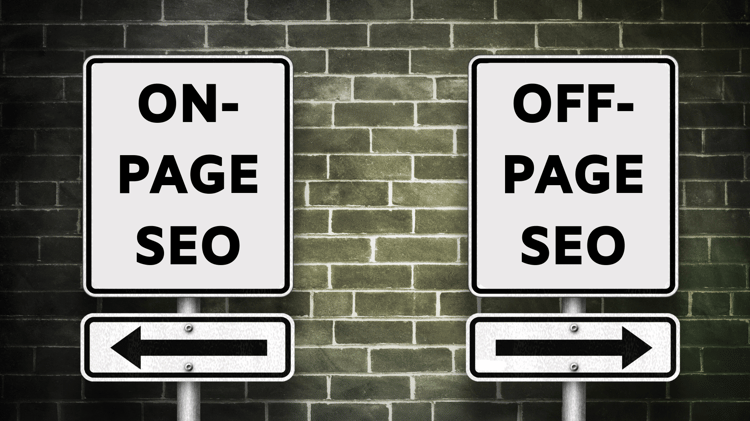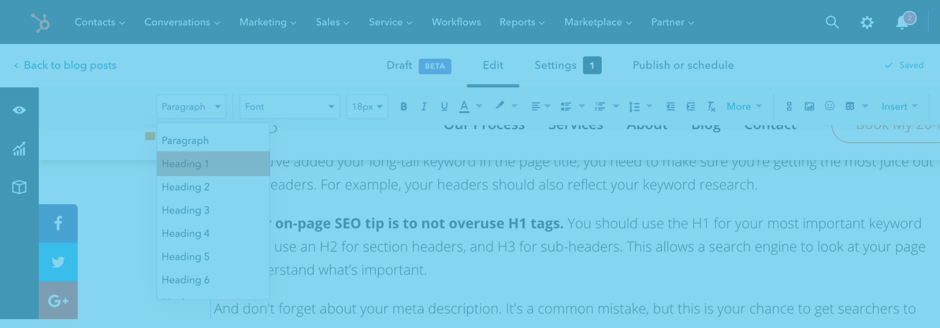Search engine optimization (SEO) is more than a marketing buzzword that’s been around since the 90s. SEO is a practice that literally makes or breaks your visibility throughout all of the internet’s search engines.
For nearly 30 years, SEO experts have been navigating Google’s ever-changing algorithm, which like most things from the 90s, has changed quite a bit over the years. However, the foundations of both on-page SEO and off-page SEO have remained the same.
A search engine will always be rooted in strong keyword research, educational content based around that keyword research, and reputable sites linking back to your content. The perfect SEO strategy isn’t just rooted in one of the two - on-page SEO or off-page SEO. It plans for both and adjusts over time. Sure, there might be new tactics or tips to beat a new algorithm, but if you set those three practices as your SEO foundation, search engines will recognize and reward those efforts.
But, let's back up a bit and explore the difference between off-page SEO and on-page SEO. Let's dive in!

Starting with On-Page SEO
On-page SEO provides the lowest hanging fruit of any organic SEO strategy. However, it’s not like throwing spaghetti at the wall and hoping it sticks. Your on-page SEO strategy is only as strong as your keyword research. And here's the thing - it entails much more than just sitting around and talking about what keywords you’d like to show up for. It’s using keyword planning tools (like Moz.com and SEMrush) to analyze those keywords you would like to rank for and then build off of them to find sweet spot long-tail keywords.
A long-tail keyword is a more specific keyword. For example, if you are a homebuilding business in Charlotte, NC, then you might start with a broad term like ‘Homebuilders in Charlotte’. The quick way to turn this broad keyword into a long-tail keyword is by adding to it. Something like, ‘ranch homebuilders in Charlotte, NC’. This keyword is more specific. The monthly search volume will be lower than if someone were searching for just homebuilders, but the opportunity to appear higher in the search engine results will be greater for more specific, long-tail keywords.

Once you have completed thorough keyword research, you’re ready to optimize for on-page SEO. The key is to go page by page and change certain elements to reflect the findings from your keyword research. Those elements are:
● Page title
● Header structure
● Meta descriptions
● Image alt text
● URL structure
The page title is one of the first things Google, and other search engines, look at when determining where your page ranks for certain keyword terms. It’s not a case-by-case basis where someone quickly analyzes a search query and then shows you the most relevant pages. It all runs off of an algorithm. Search engines can read virtually any text and then instantly show the most SEO-friendly results. So, having a page title that sums up exactly what your page entails in the form of a long-tail keyword is essential to ranking well on search engine results pages (SERPs).
Once you’ve added your long-tail keyword in the page title, you need to make sure you’re getting the most juice out of your headers. For example, your headers should also reflect your keyword research.
Another on-page SEO tip is to not overuse H1 tags. You should use the H1 for your most important keyword and then use an H2 for section headers, and H3 for sub-headers. This allows a search engine to look at your page and understand what’s important.

And don't forget about your meta description. It's a common mistake, but this is your chance to get searchers to click on your site link. A meta description is the little piece of descriptor text you see underneath the headlines (page titles) on search engines. Google doesn’t analyze your meta description for SEO purposes, but searchers certainly do. It’s important to manually change these to include a call-to-action and your long-tail keywords. For example, “Learn more about how XYZ Builders can help you build the ranch home of your dreams.” A call-to-action and a quick sentence encourage searchers to click through to your page.
.png?width=1920&name=Off-Page%20vs-%20On-Page%20SEO%20-%20Meta%20Description%20(1).png)
Another step for on-page SEO that is often forgotten is image alt text. Believe it or not, search engines can't look at a picture and know what it is or what it represents. This is why image alt text is extremely important. Most content management systems allow you to add image alt text right after uploading an image. Make sure to include your relevant long-tail keywords to further your opportunity to rank.
Lastly, consider the URL structure of your website. If you are writing a blog post, the title of the blog post is often part of the URL by default. So, it’s imperative that you include your long-tail keywords in the title of your content. The same goes for any page on your website. If you want to go back and restructure some of your current URLs to follow this best practice, be sure to set a 301 redirect from the original URL to the new one. That way, you don’t get any pages with broken links or 404 errors.
Off-Page SEO Strategies
Off-page (or off-site) SEO focuses on everything you can do to improve your rankings outside of your own website. Link building (or backlinks) is the main focus of off-page SEO. Search engines place incredible value on backlinks, which is when another site links back to your content.

For example, if you write a great blog post on things to consider when building a new ranch home versus purchasing one already built, there is a strong opportunity for backlinks. If your post gets traction, then a company that manufactures something (like flooring or cabinetry) that goes into a new home might find it valuable enough to link back to your site.
It’s important to note that not all links are created equal. Search engines value backlinks, but they won’t reward your site for just any backlinks. They must be quality. High-quality backlinks come from sites that have a strong and reputable web presence, also known as domain authority. For example, a backlink from Lowe's Home Improvement will go a lot further than a backlink from a random blog with a minimal following and low domain authority.
It’s also important to beware of black hat link-building strategies. If someone promises you 500 backlinks in exchange for a certain dollar amount, oftentimes that strategy won’t pay off - especially in the long-term. The best way to build links is through creating incredible and educational content that people will read over and over again and even share.
Link-building relationships are common as well. However, be sure it benefits both parties. People reach out to each other all the time to ask for a link back to their content. A perfect scenario here is when someone in your industry, but not a competitor, sends you an email and asks for a link to their content in exchange for a link to your content on their website. For example, if HubSpot notices we write a blog post about buyer personas, someone from their team might reach out and ask for us to link to their content based on what we publish. As a HubSpot Diamond Partner, a relationship like this would be beneficial for both parties.
Other Off-Page SEO Strategies
While link building is the pillar of off-page SEO, there are other factors outside of your website that can directly impact your search engine visibility. Tactics like guest blogging and social media marketing can all help drive organic traffic to your website.

Guest blogging is a great tactic that not only forges a relationship, it also provides an opportunity for backlinks. Offer to write a guest blog post for an industry-relevant publication in exchange for a link to your website. You can offer the same opportunity to thought leaders in your industry.
Just remember, the quality of the link is important. If the site linking back to yours isn’t reputable and doesn’t have at least decent domain authority, it won’t do anything for your site. If it is a worthy link, you can also offer them the opportunity to write something for your site and you can provide them with a backlink. As long as it’s mutually beneficial, it’s a no-brainer for both parties.
Lastly, a strong social media presence and brand can really increase traffic to your website. If you are posting relevant and educational content, more people will engage with your brand on social media. This promotes brand awareness and will increase organic searches for your website and your traffic overall. Your social media platforms also provide opportunities for you to promote your blog posts and other website content.
Tying It All Together
On-page SEO and off-page SEO are both important when trying to increase your overall search engine visibility. It’s not one versus the other; it’s both strategies working together towards the common goal of increased website traffic, strong domain authority, and increased brand awareness.
If overall SEO or search engine visibility is a pain point for you, we can help! After all, you can have the most beautiful website in the world, but if it’s not optimized for SEO, no one will see it. And that's a major bummer. Luckily, our team of dedicated SEO experts eat, sleep, and breathe content and SEO. Contact us anytime and we'll partner with you to build a strong SEO strategy that increases brand awareness, but more importantly, gives you the competitive advantage you’ve been searching for.
On-page and off-page SEO are two essential tactics for boosting website traffic and generating leads. But, if you're looking for more ways to get results through your website, snag your copy of our FREE 25 Website Must-Haves guidebook!


